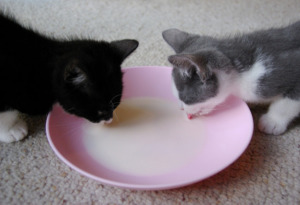
Two cats drinking soy milk
Yes. In moderation, it is safe for both cats and dogs to drink soy milk. Soy milk and other soy products are not toxic or poisonous to either cats or dogs. There are a few caveats to keep in mind, however.
Some brands of soy milk contain additives that are difficult for dogs and cats to digest, causing upset stomach or flatulence. Additionally, some pets may be allergic to soy milk. Read on for the full story.
Soybeans are healthy for cats and dogs
Soy milk is made by grinding and boiling soybeans, then filtering out the fiber and particulates. Soybeans are a very healthy plant-based source of protein. In fact, soy is one of the few plant-based sources of complete protein. This means soy protein contains a good quantity of all nine essential amino acids, the building blocks of protein. Very healthy.
Today, many commercial cat and dog foods even include soy in their blend of ingredients. Soy is a cheaper and, many would argue, healthier source of protein than animal protein. The fact that soy is used in pet food is another strong indicator that it will not harm your dog or cat. Now that we’ve established that soy itself is healthy, let’s take a look at what to watch out for when feeding soy milk to cats and dogs.
Soy milk often contains additives that may upset your pet’s stomach
Most brands of store-bought soy milk contain various additives to make them sweeter, more milky, and prolong shelf life. These additives may make it difficult for your dog or cat to digest. Additionally, some individual pets may be allergic to one or more of them.
Soy milk fortified with dairy
For example, many soy milks are fortified with powdered milk to give them a consistency and taste more in line with cow’s milk. Most adult cats and some dogs are lactose intolerant, making it difficult for them to digest dairy. Lactose is a disaccharide, a sugar that composes about 2% to 8% of cows milk. All dairy products contain lactose.
Lactose is broken down by chemical called lactase. Kittens do produce lactase so that when they wean, they can digest their mother’s milk. But cats stop producing lactase within a few months of birth. So, many adult cats have stomach problems when drinking soy milk that has been fortified with cows milk or other dairy products.
Lactose can cause upset stomach, diarrhea, and flatulence in cats and dogs. Pure soy milk is dairy free, but you’ll want to check the label to make sure the brand of soy milk you are feeding your cat has not been fortified with cows milk or other dairy ingredients.
Dogs are generally much more tolerant of dairy than are cats. My dog eats cheese, ice cream, and drinks any kind of soy milk with no problem. But all dogs are different.
Added sugar in soy milk
You also need to be careful with the extra sugar content of soy milk. Typically, soy milk contains about 7% added sugar. To keep your pet healthy, choose soy milk that doesn’t have any added sugar or sweeteners.
Cats, in particular, don’t have any taste receptors for sweetness. They can’t taste sugar, anyways. The added sugar in soy milk can contribute to diabetes and obesity, so please make healthy choices for them.
Let your dog or cat drink just a little soy milk, at first
The biggest risk with cats and dogs drinking soy milk is an upset stomach. So, the first thing you want to do is comb through the ingredients and find a soy milk free of dairy and excess sugars. When introducing any new food to your pet’s diet, go slowly.
So let your pet drink just a little soy milk at first and check his reaction to it. Slowly increase the amount that you give, letting his system get used to digesting soy milk. This is the best way to prevent an upset stomach, and make sure that your cat or dog is not allergic to any of the ingredients in his soy milk.
Soy Milk, Delivered
 |  |  |
| Regular Soy Milk | Sugar-Free Soy Milk | Vegetarian Soy Milk |


Leave a Reply